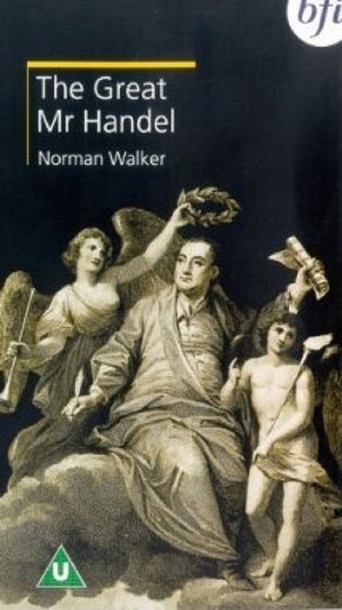

Purely Joyful Movie!
... View MoreA brilliant film that helped define a genre
... View MoreWhile it is a pity that the story wasn't told with more visual finesse, this is trivial compared to our real-world problems. It takes a good movie to put that into perspective.
... View MoreGreat movie. Not sure what people expected but I found it highly entertaining.
... View MoreFor the first Technicolor feature produced by his organization, Rank went to his WHV production arm; this was the group that did movies on sacred subjects. The subject was George Frideric Handel and how he came to write his MESSIAH.The best part of this movie is the cinematography. Two men are credited: Claude Friese-Greene, who had more experience with color camera work than anyone else in Britain -- he and his father had developed Biocolor, which was never commercially successful. This turned out to be his last completed movie. His co-cinematographer was Jack Cardiff, whose painterly vision is very apparent here. The whole thing looks like a series of paintings from Handel's era. The music, being Handel's, is beautiful. The story, of how Handel (played by Wilfred Lawson), grown unfashionable, continues on, supported only by Elizabeth Allan as Mrs. Cibber and his faithful servant, played by Hay Petrie, is adequate to the task.Were these the only considerations, this would be fine movie. Unfortunately, while Mr. Lawson's performance is great (he plays Handel as someone who has not quite grown used to speaking English; his language is that of the orchestra) and Hay Petrie speaks his lines as he always does, which is why he was such a successful character actor, the other performers talk as if they are amateurs reading their parts off the script for the first time. Given the long and successful careers of many of these performers, this is an annoying puzzlement.A talking movie is more than pictures and score. The dialogue is the glue that holds the pieces together and tells the story. The failure here leaves the movie-goer looking at a beautiful and sometimes very interesting effort (when it is just Lawson and Petrie, or when Handel's music is being performed -- although none of the actors are very good at faking their playing of instruments -- but ridiculously dull at other moments. The result is a movie that is definitely worth watching, but not more than once.
... View MoreThis is a dreadfully dull biopic in an era of stodgy biographical stories.Probably made for propaganda purposes.The best aspect of this film.The sort of colour that seemingly could only be achieved by early three strip Technicolor.Jack Cardiff receives a credit as one of the cameramen.Wilfred Lawson plays the title role with a truly dodgy German accent.This film really represented the pinnacle of his screen career,partly due to his alcoholism.By the fifties he had slipped well down the cast and was playing character parts with that rich fruity voice.Sadly this is a very dull film whose narration is partly explained by lengthy interrupted.In truth this film is only likely to find favour with fans of his music.
... View MoreOne thing Winston Churchill and Adolph Hitler had in common was their belief in the power of film as a medium. Hitler had Joe Goebbels cranking out propaganda films for the morale and Churchill gave generously to the British film industry for certain films he deemed important. One of them was Laurence Olivier's Henry V and another was J. Arthur Rank's production of The Great Mr. Handel.For those who don't remember their history the United Kingdom at the point our story begins was ruled by George I of Hanover who spoke no English, but was the closest unquestioning Protestant heir. George was Duke of Hanover and held a nice chunk of German real estate in the middle of that then geographical expression called Germany. A lot of Germans were able to emigrate to Great Britain to seek their fortune and composer George Fridrich Handel was one of them.George I dies and George II whose native tongue was still German was now king. But his lack of English and boorish conduct in general like his father didn't near and endear him to many. His son however Frederick the Prince Of Wales had his own following.Most of this film is taken up with a rather stupid quarrel that Handel has with the prince and Frederick's attempts to ruin him artistically. Back then artists of all kinds depended on the patrimony of the wealthy and getting out of favor with royalty was not something the wealthy wanted. And Handel was an irascible stubborn guy who was not about to kowtow to anyone even for his art.Wilfrid Lawson plays Handel and Max Kirby the Prince of Wales. Elizabeth Allan is the actress/singer Mrs. Cibber who sang much of Handel's work. It's interesting to compare Lawson's Handel with another film about Handel where Trevor Howard plays the German expatriate composer from his deathbed as he reminisces about some focal points of his life. I think Howard caught the man a lot better, his raspy voices was made to play curmudgeons.Still classical music fans will like this film.
... View MoreThis movie seems to sum up the dull, pompous Victorian view on Handel. It focuses on his premiere of "The Messiah" (Dublin, 1742), with all the virtuous clichés that have transformed for a while that masterpiece and the untamed Handel in a sort of propagandistic stuff. In war-time, it was understandable England's desire for something stimulating and "British". Ironically enough, Handel was a German, remember? Why didn't they represent him more vigorous, irascible, jolly and enthusiastic (this was also one of his faces, especially while dealing with music, I suppose)? Who knows... Such castrated and didactic views are repelling young people from the great music and the great figures of the past. Too bad. The leading actor was so melancholic all the time!
... View More